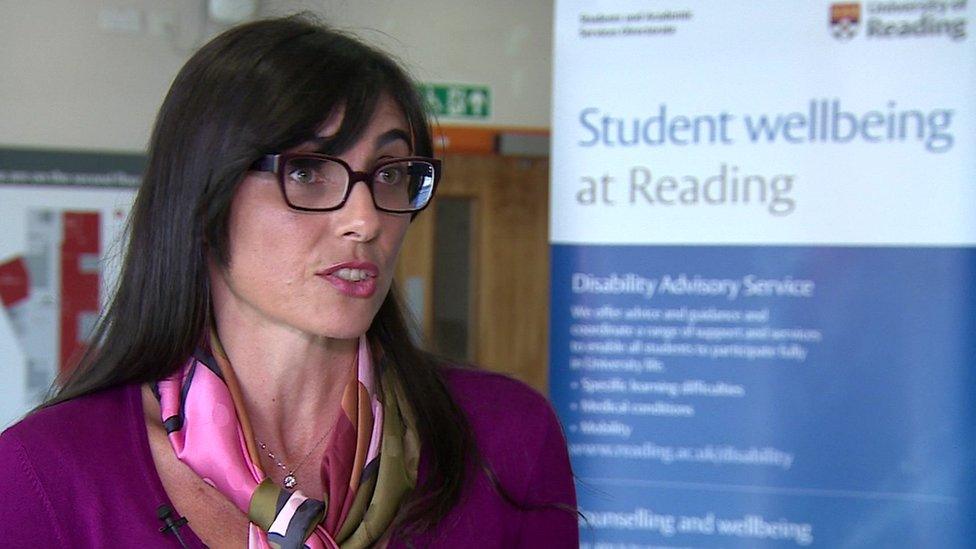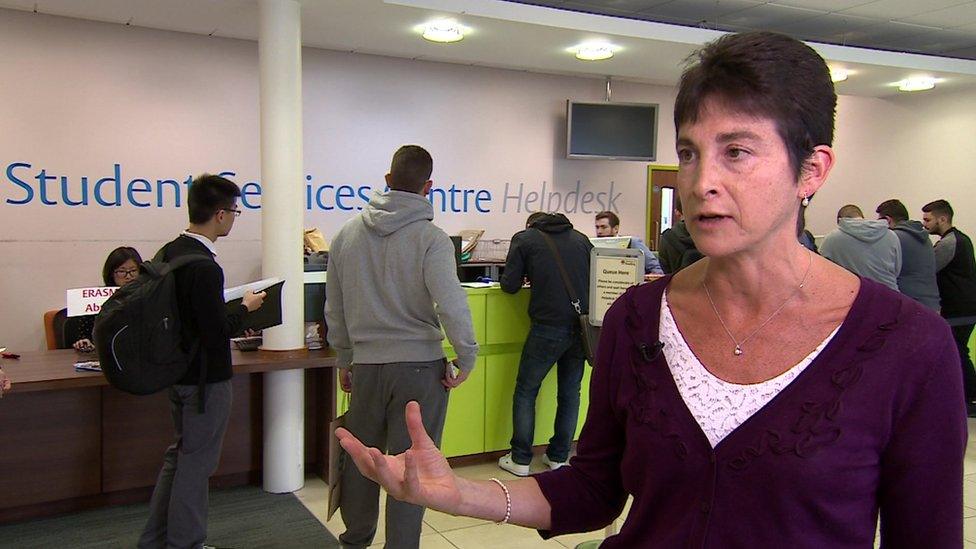Rising numbers of stressed students seek help
- Published
Sir Anthony Seldon says universities are not accepting their responsibilities towards young people
Record numbers of students are beginning university this term, making the big emotional step of a new independent life, with many living away from home for the first time.
But there are warnings of rising numbers of students struggling to cope with life on campus, with sharp rises in the demand for counselling.
And there are questions about whether universities are providing enough support for emotional and mental health problems.
Ruth Caleb, chair of Universities UK's mental well-being working group,, external says counselling services are facing an annual rise in demand of about 10%.
She estimates the use of counselling usually ranges between 5% and 10% of students, depending on the university, which would suggest at least 115,000 students are seeking help.
Sir Anthony Seldon, vice chancellor of Buckingham University, says this is a "massive problem" and universities have been "negligent" in accepting their pastoral responsibilities.
Meredith Leston suffered from depression and is campaigning for better support for students
"Universities are not always honest about admitting the extent of the problems they have. They need to change, they need to take their responsibilities to students far more carefully."
A report , externalfrom the Higher Education Funding Council for England, using anonymised data, found a rapid increase in demand for counselling, with one institution seeing an annual increase of more than 50%.
This analysis, published before the new term, showed mental health problems on campus had "increased dramatically" in recent years, rising from about 8,000 to 18,000 in the four years to 2012-13.
The study also warned students want help with more serious problems. Instead of homesickness or relationships, they are increasingly suffering from "anxiety, depression or low mood. Additionally, increasing numbers of students are at high risk of harming themselves".
Anxiety culture
The University of Reading says there has been a 20% year-on-year increase in students wanting help from counsellors.
The university's head of well-being, Alicia Pena Bizama, says students feel under more pressure.
As well as perennial problems of loneliness and relationships, she says there are worries about the rising cost of studying, fear of failing to live up to expectations and uncertainties about job prospects.
"There is a cultural change in being a student," says Dr Caleb, who is head of counselling at Brunel University.
Instead of a stereotype of student life being about long lazy days, she says increasing numbers experience anxiety and stress, beyond the "transitional" problems of leaving home.
Student life is also affected by wider social changes. Dr Caleb says there is a pattern of parents splitting up when their child goes to university and sometimes selling the family home, which can leave young people feeling vulnerable and unsupported.
'It can save people's lives'
Universities are getting better at responding to mental health problems and making it easier to access counselling services. But Dr Caleb says there needs to be more consistency in the quality of services available.

Marina Della Giusta is monitoring students' well-being at the University of Reading
She says that at her university, "we will knock on a door at night if there are concerns. It can save people's lives".
But what is so different now about young people's lives? Is there really such a culture of anxiety?
Meredith Leston, a student at St Anne's College, Oxford, suffered from anorexia and depression in her first year.
"People talk about 'snapping' and that is what happened to me. I just couldn't take the pressure and the whole new realm of expectations."
She says part of the problem is the ever-present role of social media, fuelling a culture of constant comparison and a sense of inadequacy.
"As well as being a first class student, you have to be a first class person, you have to be performing socially, academically. It's a nightmare. You're constantly on."
'Suffering in silence'
Ms Leston says she received help from her university, but she is worried about the patchy provision for some students.
"I do worry that a lot of students are suffering in silence at the moment."

University has always been a balancing act, but more students are needing help with stress
"I think there is a very strong stigma still surrounding mental health issues, but even in the few years I've been at university, I've seen a slow change, people are beginning to talk about it."
Following her own experiences, she is supporting a mental health charity, Student Minds, external, and has founded her own campaign, Meeting of Minds.
Sir Anthony Seldon recently became a university head after working as a head teacher in the independent school sector.
And he says universities have much catching up to do on student well-being.
Sir Anthony warns some universities might see their status in terms of research and league tables, with the danger they view undergraduates as an "inconvenience".
But he says they cannot ignore the rising incidence of problems such as depression, anxiety and eating disorders.
"Universities, with some exceptions, haven't been fully owning up to the extent of the malaise among young people. Or understanding what can be done to ameliorate these problems."
"I don't think universities mean to be negligent. But if not deliberately, they are being negligent, they are not accepting their responsibility for these young people. And needless avoidable problems are occurring all the way up to suicide."
'Sink or swim'
The increase in tuition fees has also changed students' expectations.
Universities are now competing on the quality of their services as well as academic prowess. And students expect to have support for emotional problems.

Alicia Pena Bizama says students are feeling extra financial pressure
Three student protests and occupations this year have called for better counselling services.
At the University of Reading student welfare has been made a priority, including a long-term project to monitor well-being.
Marina Della Giusta, responsible for the research, says students are "definitely feeling more stressed".
"The factors that really drive it are financial stress, university education has become more expensive. And job prospects are more uncertain, so they're not sure whether it's going to pay off."
The other constant thorn is the expectation to be seen to be having a good time, with social media turning social lives into a place of competition rather than relaxation.
But the increase in using counselling services also reflected a greater willingness to ask for help - and Dr Della Giusta says universities are moving away from a "sink or swim" attitude.
"There's no point turning out students who have a first if they are going to be unhappy and unable to function as human beings out there in the workplace or in their personal life."
Universities UK says it issued guidance this year to all universities on how to support students with mental health problems.
"Universities take student mental health very seriously. For some students, an unfamiliar higher education environment can be stressful, particularly for those who already have an underlying illness," says chief executive Nicola Dandridge.
"Some students are reluctant to disclose their difficulties, which can also present a challenge for universities seeking to support them. However, the development of policies and anti-stigma campaigns is now beginning to address both these issues."

Your comments:
There was a time (before instant messaging) when you used to sit down with your mates and have a good conversation, and together you'd work things out. It seems that a shrink is the only person you can talk to now! When it was just the academic elite that went to university, the studying was relatively easy for them. Now your average Jo(e) is expected to get a degree they have to work much harder and are under much more stress to achieve. David, Northampton
Thanks for this piece; I really appreciate it. I've just finished my degree at university and had to take a year out to deal with anxiety. I wrote about this experience on a short blog, https://henryegar.wordpress.com/2014/04/09/the-reasons-i-worried-part-i-2/. I'm currently writing a follow-up on the experience of positive change, learning to manage these feelings and becoming a much happier person. A team of us are also currently making a film about mental health issues at our university. Henry, London
Judging by the numbers of very stressed sixth form students I teach I am totally unsurprised by this statistic. Most students are terrified of failing, constantly reminded how important it is to get high grades. The culture of obsession with target grades in school leads to a tense atmosphere as both teachers and students are judged against them. Schools also struggle to get enough counsellors and support for their students. Quick referrals are only for the suicidal meaning many students have to wait 33 weeks to a year to get any real help. It is really time to rethink what an education is worth. EJ, Heswall
I was at medical school 1994-2000. We all felt stressed periodically, but it was most unusual (<2% of the whole year) for any of us to seek to postpone. Part of the increase is likely to be due to availability. In my time, the student counselling service was a door with a sign over it, and if you looked all over the union you might just find a few small cards with phone numbers. There has been a massive increase in posters, talks etc about student wellbeing. And asking for such help, even when unbeknownst to others, causes much less internal agitation nowadays. Plus, students are definitely expected to work more these days. "I'm a graduate" doesn't cut a lot of mustard in the milk-round if you got a 3rd. Medicine and dentistry students, I believe, had less stress because there was a cast-iron guarantee of a job. Max, Yarm
I actually think the figures of those using counselling display something else, much more positive for universities. Since graduating, I was diagnosed with depression and waited a month to be given 6-weeks free CBT therapy. Following this, there was waiting list for months for any free therapy given (for example through the charity MIND) and I was recommended to find my own private counsellor as the wait would be so long. This took time, and also costs money. Ranging from £25-£150 per session. To be struggling mentally and having to take on this task and financial burden shows a huge flaw in the mental health system in the UK.
However, at university, counselling is freely offered. I believe that the figures show what happens when counselling is freely available. At university you receive better care- counselling is made freely available to anyone, and there is a high degree of privacy around the counselling (they tended to be in rooms that I didn't even know existed before I received counselling), and there is no limit on the amount of sessions you can receive. Lydia, London
Oh dear all these do gooders protecting the little luvvies again and wrapping them in the cotton wool life that they have led until now. When we were young if we wanted to buy things we had pocket money and/or had to get a paper round, weekend job or both which gave us grounding before going to University but these kids get it all given to them on a plate and sulk if they don't get the latest IPhone etc. so it's a big shock when they have to learn to wipe their own backsides. David, High Roding
I first received counselling and a diagnosis of depression at university (ten years ago now) but I don't think that was to do with the stress of university per se. On the contrary, I was so much happier there than at school, and made friends for life. I wonder if some of this increase is because of the well-documented increase in poor mental and emotional health at school age. University is where it all comes to a head, where you have to face it - and where you are more likely to be taken seriously and get help than possibly anywhere else. Katherine, Grimsby
I was diagnosed a year or so before starting university, having been depressed for much longer, and developing quite bad social anxiety too. I struggled through first year before telling the university at the end of the year, when I was told I would be looked out for and checked up on. I got a few free counselling sessions and was referred to an external counsellor, which was all good. The university themselves gave basically no support. I met my personal tutor once, no one commented on my severe lack of attendance/missing of deadlines, and no one ever checked in to see if I was okay. They just handed the problem to an external source and forgot about it. I just felt completely isolated and abandoned. Sophie, Sunbury-on-Thames
I've sought counselling during my undergraduate and postgraduate studies for stress, anxiety and acute insomnia. However, in my experience, university counselling services are way over subscribed and under funded and are unable to cope with the rising numbers of students seeking help. Academia has just accepted that students will face mental health problems without addressing the root causes and exploring the reasons behind the challenges and it's high time that someone explored why so many university students, and staff, are struggling with their mental health. Clare, Leeds
As a private tutor with a long career in teaching, I think the stress starts long before students arrive at university. Many of my students are put under huge pressure even at primary school, by parents, school league tables, 11+ , common entrance, SATs, GCCEs, Bacs, A Levels and so on and so on. By the time students get into uni, stress has already been the default situation for years. Un fact, it you are not stressed, you are not keeping up with the competition and there is something wrong with you(!) Chris, Shepperton
I'm sure that financial pressure and worries about job prospects play a role. But could it be that today's generation is simply a lot less prepared for this transition - becoming independent ...? Sabine, London
I am horrified at the lack of support given to young people at university. My son started at a top London art college last year and probably only survived because he'd done 5 years at boarding school beforehand which gave him the resilience to cope. The halls were expensive but grotty, no decent communal area, five miserable bedsits per 'flat' with a bleak shared kitchen. Posters and pictures were forbidden on the walls. A spot check on my son's room which he had made friendly with flags and pictures incurred dire warning of fines and a demand for everything to be removed. I am not at all surprised at the high incidence of drop out by students from the lowest socio-economic groups. There is no support for them, the existence is lonely, the costs are enormous, the tutors are indifferent and there is the barest minimum of tuition. I was lucky enough to go to Cambridge 30 years ago. Many of the new universities are a complete scam. Caroline, Market Rasen
I went to university in the early 1960s. one of 113,000 that year. It was the London University agricultural faculty and therefore rurally based. We were a relatively small, close knit community, there were no drugs and no discernible mental hangups other than was normal for young people of this age and life was enjoyable and a wonderful experience. We worked hard and played hard. I think young people then were tougher mentally and physically, no pet descriptions were available to describe the odd blip and no havens existed to help those who simply found themselves in an environment in which they could not survive . They just got out and did something else. There were more opportunities for both graduates and people with other skills in those days but you still survived by your own endeavours and parental support almost always disappeared as you approached late teens. You simply became a survivor because there was no description for your perceived weakness, you simply had to tough it out. Bob, King's Lynn
Conscientious, intelligent, and empathic people (by no means a minority) are the most stressed by formal education because they understand and try to meet complex and contradictory expectations. Both meeting them and not meeting them are equally stressful.
The brightest young people I know, Oxbridge graduates some, are the worst learners; they assimilate and accommodate knowledge, understanding, and skills like out-of-control vacuum cleaners, but the process results in mental illness. Something that is a natural propensity is somehow constrained to take place in a context full of other people's needs and ambitions and the personal shame of relating to your friends and family through a series of self-evidently meaningless achievements. One cannot derive a secure sense of self from an education system (or a family system) that defines the child's success in terms of the institution's own survival needs - this is the very essence of a dysfunctional relationship.
The mental health of young people will continue to worsen as the relentless march of competitive marketisation and corporate managerialism drives both teachers and children to anxiety and depression. Everyone knows this, and everyone says it in private, in staffrooms, head's offices, dinner tables, and counselling centres. Our failure as educators is that we don't stop it. Nick, Birmingham